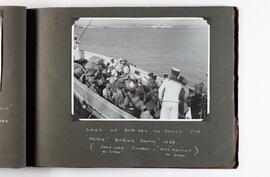Arthur Wait described what he did when he was on leave and the relations between the British and the Maltese who worked with the navy. He mentioned the political situation in Malta in the 1960s and 1970s and the way this crisis affected those who worked for the British Forces. He returned to Malta in 2007.
Sailors
35 Archival description risultati per Sailors
Arthur Wait (front row, bottom right) and his class/fellow recruits at HMS Raleigh. The photo was taken during Royal Navy training.
6" guns, sailors and members of the public aboard HMS Lion.
Arthur Wait (lying on grass) play-fights with four of his fellow naval recruits at HMS Raleigh. The photo was taken during Arthur Wait's naval training.
In the last part of the interview Ettore Raffi described two pleasant experiences which happened during his life at sea.
This photograph was taken during Arthur's active service in the Royal Navy.
This manuscript was written by Arthur Wait and proofread and edited by Sandra Blake of the National Archives of Malta. The author dedicated this book to "all Maltese boy seamen who served in the Royal Navy aged fifteen years, and who joined HMS Ganges; some of whom are no longer with us. I salute you all".
In the interview, Ettore Raffi spoke about his experiences of life at sea and his voyages to Tunisia, Panama, Mississippi and the Mediterranean. He travelled to Malta three times during different periods. He shared memories regarding trade between Lampedusan fishermen and sailors and the Maltese. The Lampedusans used to consider Malta as a rich island because of the availability of tobacco, sugar, chocolate and bars of soap. He recalled relations between Maltese, Italian and British sailors, as well as the nightlife in Valletta, particularly related to Strait Street, and Maltese women. Ettore Raffi gave us his opinion about Maltese culture, the period between 1964-1979, the Dom Mintoff government and the changes after Independence.
In this part of the interview Ettore Raffi spoke about his travels as a sailor in different parts of the world: Tunisia, Panama, Mississippi and the Mediterranean.
In the interview Ettore Raffi shared memories regarding trade between Lampedusan fishermen, sailors and the Maltese. The Lampedusans used to consider Malta as a rich island because of the availability of tobacco, sugar, chocolate and bars of soap. He recalled relations between Maltese, Italian and British sailors, as well as the nightlife in Valletta, particularly related to Strait Street, and Maltese women. Ettore Raffi gave us his opinion about Maltese culture, the period between 1964-1979, the Dom Mintoff government and the changes after Independence.
The logbook was granted on the 2nd of April 1976. It contains all of Ettore Raffi's professional titles and qualifications, visas granted by different border police offices and foreign consulates, and all the embarkation and disembarkation movements.
Image includes a photo of members of the navy and military at sea
Dates covered: 1940-1980. Arthur Wait was born in 1940. He came from a long standing naval family. He described life as a child in Birzebbuga and the hardships endured by the Maltese in the post-Second World War years. He recounted how he joined the navy and his life as a Maltese man in the British navy. He also mentioned the closing of the military base in Malta and how it affected those people who worked with the British Forces.
Arthur (first from right) and three naval colleagues.
Three images of Arthur Wait's grandfather, father and Arthur himself, in naval uniforms. The fourth image contains a smaller image of Arthur's father (same as large one mentioned above), and four medals with description underneath. Four different images have been photocopied to produce one A4 sheet of paper containing all four images.













